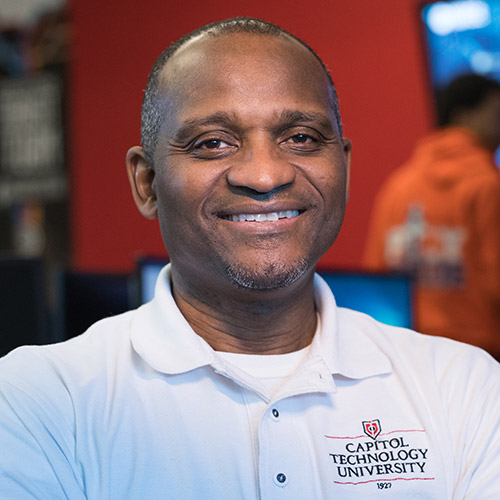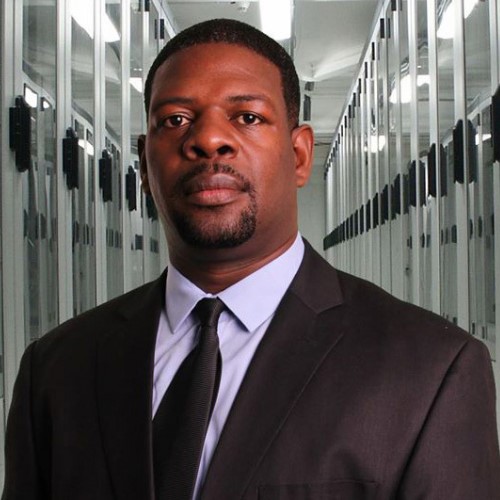Doctor of Education (EdD) in Cyber Science
![]()
Earn an EdD in Cyber Science and lead the advancement of technology and cybersecurity in higher education.
The Doctor of Education (EdD) degree in Cyber Science merges the field of cyber with aspects of STEM education, computer science, networking, and information technology, giving graduates depth to their cyber knowledge and how it can be applied to the academic platform. Students in this program will learn educational leadership skills that can be leveraged within a wide range of industries worldwide, including higher education, that are in need of experienced cyber professionals.
The EdD in Cyber Science is for current or experienced professionals in a field related to cyber, computer science, or technology management. Students will pursue a deep proficiency in this area using interdisciplinary methodologies, cutting-edge courses, and dynamic faculty. Graduates will contribute significantly to the Cyber Science field through the creation of new knowledge and ideas, and will quickly develop the skills to engage in leadership, research, and publishing.
As your EdD progresses, you will move through a series of progression points and review stages by your academic supervisor. This ensures that you are engaged in research that will lead to the production of a high-quality dissertation thesis and/or publications, and that you are on track to complete this in the time available. Following submission of your EdD Thesis or accepted three academic journal articles, you will have an oral presentation assessed by an external expert in your field.
Why Capitol?
Expert guidance in doctoral research
Capitol’s doctoral programs are supervised by faculty with extensive experience in chairing doctoral dissertations and mentoring students as they launch their academic careers. You’ll receive the guidance you need to successfully complete your doctoral research project and build credentials and network in the field.
Proven academic excellence
Study at a university that specializes in industry-focused education in technology-based fields, nationally recognized for academic excellence in our programs.
Program is 100% online
Our doctoral programs are offered 100% online, with no on-campus classes or residencies required, allowing you the flexibility needed to balance your studies and career.
Faculty

Dr. Richard Baker
Dissertation Chair
Dr. Richard Baker is Dissertation Chair of Graduate Programs at Capitol Technology University. He previously served as associate professor in Indiana State University’s Department of Aviation Technology, and as executive director of the Center for Unmanned Systems and Human Capital Development. Richard holds a BS in mathematics and an MS in computer science from Indiana State University. He received his doctorate in information systems from Nova Southeastern University.

Dr. William Butler
Vice President
Dr. William (Bill) Butler is currently the Vice President of Academic Affairs at Capitol Technology University. Prior to this appointment in 2021, Dr. Butler served as Cybersecurity Chair for 8 years at Capitol Tech. Earlier in his career, he worked in the networking and IT industries as a network engineer and consultant for over 20 years. He also served as a joint qualified communications information systems officer in the U.S. Marine Corps and retired as a Colonel with 30 years of service (active and reserve). Dr. Butler holds a Doctorate in cybersecurity earned from Capitol focusing on preserving cellphone privacy and countering illegal cell towers (IMSI catchers).

Dr. Kellep Charles
Chair
Dr. Kellep Charles is Chair of Cybersecurity programs at Capitol Technology University. He completed his Doctorate in Cybersecurity at Capitol Technology University. He also holds a Master of Science in Telecommunication Management from the University of Maryland University College and a Bachelor of Science in Computer Science from North Carolina Agricultural and Technical State University.

Dr. Charles Conner
Associate Chair, Director of Engineering Labs
Dr. Charles (Chuck) Conner is Associate Chair of Engineering and Director of Engineering Labs at Capitol Technology University. He previously served as both an adjunct and full-time professor of Engineering at Capitol Technology University and has been instrumental in securing numerous ABET accreditations for the University. Dr. Charles Conner has worked in industry and academia since 1980. His specialty is digital signal and image processing. He started teaching (part-time) in 1984.

Dr. Ian McAndrew
Dean
An internationally recognized leader in research and expert on low-speed flight, Dr. McAndrew has five degrees: a PhD, two master’s degrees and two bachelor’s degrees. He is a Fellow of the Royal Aeronautical Society. Dr. McAndrew chairs several international conferences and journals and is invited to give keynote speeches all over the world. He started his career in the automotive industry as an engine designer, and has worked at several universities across the globe. Dr. McAndrew is Dean of doctoral programs at Capitol Technology University. An external examiner on the world wide stage (UK USA, Germany, Italy, Jordan, Japan, Australia, Greece and Kenya) his experience includes over 115 successful Doctorate successes.
Career Opportunities
Market demand for cyber science expertise
Graduates will contribute significantly to the rapidly growing cyber science field through the creation of new knowledge and ideas, and will be prepared for in-demand roles in higher education.
Degree Details
This program may be completed with a minimum of 60 credit hours, but may require additional credit hours, depending on the time required to complete the dissertation/publication research. Students who are not prepared to defend after completion of the 60 credits will be required to enroll in RSC-899, a one-credit, eight-week continuation course. Students are required to be continuously enrolled/registered in the RSC-899 course until they successfully complete their dissertation defense/exegesis.
The PhD program offers two degree completion requirement options:
- Dissertation Option: the student will produce, present, and defend a doctoral dissertation after receiving the required approvals from the student’s Committee and the PhD Review Boards.
- Publication Option: the student will produce, present, and defend doctoral research that is published as articles (3 required) in peer reviewed journals identified by the university and the student’s Committee. Students must receive the required approvals from the student’s Committee and the PhD Review Board prior to publication.
Prior Achieved Credits May Be Accepted
Tuition & Fees
Tuition rates are subject to change.
The following rates are in effect for the 2024-2025 academic year, beginning in Fall 2024 and continuing through Summer 2025:
- The application fee is $100
- The per-credit charge for doctorate courses is $950. This is the same for in-state and out-of-state students.
- Retired military receive a $50 per credit hour tuition discount
- Active duty military receive a $100 per credit hour tuition discount for doctorate level coursework.
- Information technology fee $40 per credit hour.
- High School and Community College full-time faculty and full-time staff receive a 20% discount on tuition for doctoral programs.
Find additional information for 2024-2025 doctorate tuition and fees.


